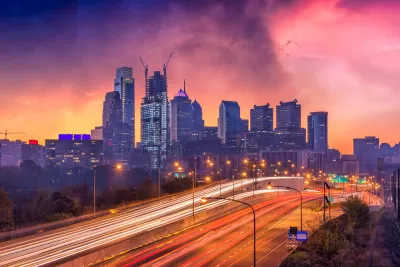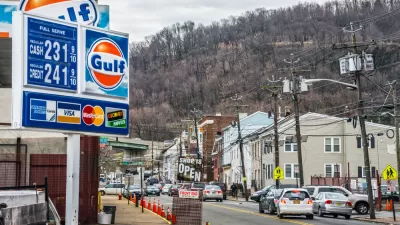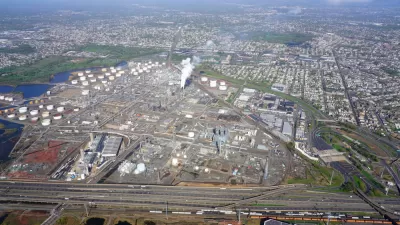Nine Mid-Atlantic and Northeast states and the District of Columbia have agreed to work together to develop a policy to price emissions from transportation, set a 'cap' on them, and invest the revenues in low carbon transportation solutions.

Connecticut, Delaware, Maryland, Massachusetts, New Jersey, Pennsylvania, Rhode Island, Vermont, Virginia, and District of Columbia belong to the Transportation and Climate Initiative (TCI), a regional collaboration that formed in 2010 to improve transportation, develop the clean energy economy and reduce carbon emissions from the transportation sector, the largest source of emissions in most of these states as well as the nation.
According to the initiative statement [pdf] signed Dec. 18, "the participating TCI jurisdictions will design a regional low-carbon transportation policy proposal that would cap and reduce carbon emissions from the combustion of transportation fuels through a cap-and-invest program or other pricing mechanism, and allow each TCI jurisdiction to invest proceeds from the program into low-carbon and more resilient transportation infrastructure."
The participating TCI jurisdictions plan to complete the policy development process within one year, after which each jurisdiction will decide whether to adopt and implement the policy
Fuel distributors in the nine states and D.C. will be required "to buy pollution permits [or allowances] for some of the carbon they produce," writes David Abel, environmental reporter for the Globe.
"We estimate that at modest allowance prices that would cost the average driver $6 per month, the program could bring approximately $3.5 billion into the region for clean transportation investments," writes Ken Kimmel, president of the Union of Concerned Scientists.
While there are a number of policies in place to lower transportation emissions (fuel economy standards for cars and trucks, incentives and mandates for electric cars, and investments in public transit), transportation sector emissions are expected to stay flat, and may even rise.
Why? Among other things, we are missing two key pieces: 1) a legally binding mechanism to force overall emissions down; and 2) a revenue source to fund the transition to cleaner transportation.
"If approved, the agreement would be modeled after the Regional Greenhouse Gas Initiative, a nine-state regional “cap-and-invest” system for power plant emissions known as RGGI," adds Abel.
Widely seen as a national model, the mandatory market-based program has helped reduce power plant emissions from Maryland to Maine by about 40 percent below 2005 levels without raising average electricity prices.
All but Pennsylvania, New Jersey, Virginia and D.C. are RGGI members, though Gov. Tom Murphy (D-N.J.) announced on Monday that "the Department of Environmental Protection has formally proposed two rules that will steer New Jersey’s re-entry into the Regional Greenhouse Gas Initiative."
RGGI members New Hampshire, New York, and Maine have not signed, although New York and Maine are expected to. It is unclear why New York has not signed yet, but Maine is expected to join the coalition after its newly elected governor, Janet Mills, takes office next month.
Fuel allowance revenues would be spent for a variety of low carbon transportation programs that would be selected by each jurisdiction, "including public transit, carpooling and driverless car services, subsidies to accelerate the adoption of electric vehicles, and new bike lanes," notes Abel.
TCI is facilitated by the nonpartisan Georgetown Climate Center, part of Georgetown Law.
Additional reading:
- Utility Dive, Dec. 18: "Regional initiative to reduce transportation emissions would mirror RGGI."
- TCI press release: "Nine States and D.C. to Design Regional Approach to Cap Greenhouse Gas Pollution from Transportation."
- NJ Department of Environmental Protection news release: "New Jersey to Participate in Design of Regional Approach to Reduce Greenhouse Gas Emissions trom Transportation Sector."
FULL STORY: In landmark agreement, Mass., eight other states vow to cut transportation emissions

Maui's Vacation Rental Debate Turns Ugly
Verbal attacks, misinformation campaigns and fistfights plague a high-stakes debate to convert thousands of vacation rentals into long-term housing.

Planetizen Federal Action Tracker
A weekly monitor of how Trump’s orders and actions are impacting planners and planning in America.

San Francisco Suspends Traffic Calming Amidst Record Deaths
Citing “a challenging fiscal landscape,” the city will cease the program on the heels of 42 traffic deaths, including 24 pedestrians.

Defunct Pittsburgh Power Plant to Become Residential Tower
A decommissioned steam heat plant will be redeveloped into almost 100 affordable housing units.

Trump Prompts Restructuring of Transportation Research Board in “Unprecedented Overreach”
The TRB has eliminated more than half of its committees including those focused on climate, equity, and cities.

Amtrak Rolls Out New Orleans to Alabama “Mardi Gras” Train
The new service will operate morning and evening departures between Mobile and New Orleans.
Urban Design for Planners 1: Software Tools
This six-course series explores essential urban design concepts using open source software and equips planners with the tools they need to participate fully in the urban design process.
Planning for Universal Design
Learn the tools for implementing Universal Design in planning regulations.
Heyer Gruel & Associates PA
JM Goldson LLC
Custer County Colorado
City of Camden Redevelopment Agency
City of Astoria
Transportation Research & Education Center (TREC) at Portland State University
Jefferson Parish Government
Camden Redevelopment Agency
City of Claremont





























